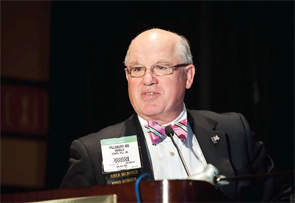
CHICAGO — Harold Pillsbury, MD, chair of otolaryngology-head and neck surgery at the University of North Carolina School of Medicine in Chapel Hill, is known as one of the more colorful figures in his field, with a bright smile—usually accompanied by a bow tie—and a forthright demeanor.
In addition to his long list of honors and publications, “He is probably one of the most loyal, thoughtful, reliable people anyone could ever want to call a friend,” said Gerald Berke, MD, president of the Triological Society.
Dr. Pillsbury—who, as he himself said, is “known for my one-liners”—gave an address here as Guest of Honor at the Annual Meeting of the Triological Society on April 29. He shared some of his favorite sayings, giving his thoughts on each and imparting lessons and motivation along the way. Here’s a synopsis:
Managed care is about managed cost, not managed care: “People size us up not for what they can get from us and care for the patient but what they can get from us for as little as possible, as if we’re a generic box of corn flakes. And this is a problem that we must resist…. The patients bear the brunt of these decisions that are made at a macro business level.”
If you live long enough, you will see everything: “I’ve never ceased to be amazed by what happens either in my clinic or in my hospital or in the world, in terms of things I never thought would come to pass. And some of it’s really good and some of it’s not so hot. But never believe that anything that could be possible won’t occur.”
Once a complication occurs, no one cares how fast you did the operation: “How many times do you hear people say, ‘Oh, I can do ten tonsillectomies in this one morning’? Well, I can tell you something. Once a complication occurs, nobody cares how fast you did the operation.”
It’s never a question of inoperability; it’s only a question of what you are willing to live without: “At the end of the day, it’s whatever that patient needs to get through whatever part of their life they feel is necessary that makes an operation something they’re willing to sustain or not. A lot of times you make the decision not just for you, or not just for the disease state, but for the patient. So, the patient and you, it’s a covenant between you and them about what they want to see done.”
A little mechanical innovationgoes a long way: “Even though the first cochlear implant looked like an office fridge that was sitting next to the patient, that was the beginning of something we never would have done without him [engineer Jack Urban]. And we see that over and over again. … When I go downstairs to that exhibit hall, there’s so much technical innovation that goes on that we embrace as otolaryngologists.”
Life is not a race to the end: “Everybody’s anxious to get to this goal or that goal and you know, you should look around every once in a while…. You have to stop and have some fun along the way. Share information with your colleagues. Talk to them about things that worry you. Be straightforward, you know? Everything isn’t always perfect. And if you share things that aren’t perfect with you, then you’ll hear things that aren’t perfect with your friends, and all of a sudden the two of you together can form a solution to the problem.”
Always do the right thing: “If you ever have a situation that occurs and you’re trying to figure out what to do, just drop back and say, ‘How am I going to explain this tomorrow to somebody who didn’t have anything to do with this? How will I explain this to my friends and colleagues?’ And if you can’t come up with an instant explanation, then you probably shouldn’t do what you’re aspiring to do.
You can delegate authority, but not responsibility: “When you know something and you delegate the authority, you still absorb the responsibility for what happened. You can delegate authority but not responsibility. And you should never forget that.”
In research, persistence pays off: “They [residents] go in the lab for a little while and sometimes they give up… And then somebody later does the same thing and they hear it at a meeting and they say, ‘Wow, I can’t believe I actually thought of that idea and here it is being presented by somebody else.’ Well you know what? If you had hung with it, maybe you’d have given that talk.”
Only put off until tomorrow what you are willing to die having left undone. (A Pablo Picasso quote.): “If I think there’s something that needs to be done, I never like to think, ‘Oh, well, I’ll do that tomorrow. I’ll do that next week.’… I can promise you, if you see something that needs to be done and you don’t act on it, by the time the next day rolls around there’s going to be a whole bunch of the next day’s problems that you have to face that will bite you in the butt, as they say.”
Leave a Reply